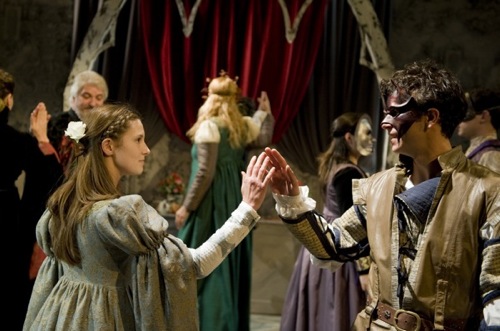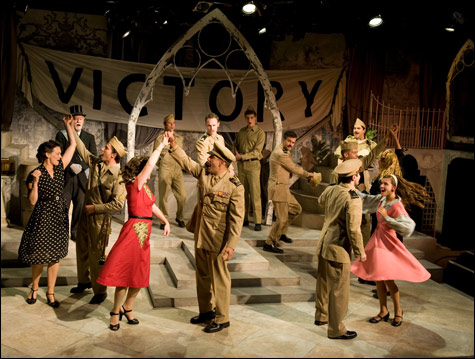Theater Review: The Bard in Rep
Romeo and Juliet and Much Ado About Nothing by William Shakespeare, in repertory at the Gamm Theatre, Pawtucket, Rhode Island, November 25 through December 5, 2009.

Shakespeare's star-crossed lovers meet in the Gamm Theatre production
Reviewed by Caldwell Titcomb
To celebrate the start of its 25th season, the Gamm Theatre in Pawtucket, Rhode Island, is offering two Shakespeare plays in repertory: “Romeo and Juliet” and “Much Ado About Nothing.” This is not an easy assignment to bring off, especially with essentially the same cast in both shows, but the Gamm is admirably up to the task. On weekends it is even possible to see both plays on the same day (as I did).
Sara Ossana has designed a versatile unit set – a central ogive and a pair of left and right steps leading up to a second level with more ogives. The basic color is a neutral gray, with rich red hangings for “Romeo” and tan ones for “Much Ado.” A few movable props are sufficient to accommodate the changes of location, abetted by Jen Rock’s varied lighting designs. Many scenes are linked by brief interludes played live on guitar, clarinet, violin and contrabass.
Helming “Romeo” is the company’s artistic director, Tony Estrella. He has given us a highly athletic production, opening with violent brawling between the Montague and Capulet factions before anyone says a word. The time is the late 16th century.
Making his Gamm debut as Romeo is curlyhaired Aaron Rossini, a recent M.F.A. graduate of Brown University/Trinity Rep Consortium. He exhibits a broad vocal range, culminating with a properly shrieked “I defy you, stars!” near the end.
Juliet is supposed to be just shy of her fourteenth birthday, and Amanda Ruggiero captures a teenage girl better than most who tackle the role. She has many delectable moments, and scampers about with giddy ardor. In the famous Balcony Scene, she does not stay aloft but comes down to the ground in order to indulge in a lot of kissing with Romeo, who is barefoot – all of which works convincingly.
Wendy Overly, who is the crown jewel of the permanent company, is magnificent as Juliet’s Nurse, even when she lies prone for a back massage by Juliet. Most of the other players give solid support, especially Kelby T. Akin as a mustachioed Mercutio, and Tom Gleadow as Lord Capulet, who can summon up anger when required. As the Prince, Sam Babbitt was underpowered, but was perhaps saving himself for the greater demands as Leonato in “Much Ado” later in the day.
There is not much one can do about the tedious scene that speaks of Romeo’s banishment some two dozen times in the space of a few lines. But the final Tomb Scene was nicely staged, though it was a novelty to have the company sing and the dead Romeo and Juliet stand up for a farewell tableau.

Swingtime in the Gamm Theatre production of Much Ado About Nothing
The “Much Ado” production was directed by Fred Sullivan Jr., who is one of the Gamm’s three resident directors. He chose to move the time up to 1945. At the outset there is a radio bulletin announcing the end of World War II, which leads to a host of servicemen in military garb celebrating with singing, dancing, playing soccer with balloons, all carried out in front of an unfurled banner reading VICTORY.
Doffing his administrative duties to play the major role of Benedick, Tony Estrella, wearing a batch of merit badges, brings lots of brio to his assumed disdain for a snooty Beatrice (Jeanine Kane), both of whom are tricked into revealing different feelings and an eventual marriage. Estrella has grown a moustache for this show, although at one point he lathers his face and gives himself a shave.
The play is officially assigned to the category of Comedy, and it was the amusing friction between the two sparring leads that composer Hector Berlioz concentrated on in his delightful final opera, “Beatrice and Benedict.” But the script also has its serious subplot, involving the villainous Don John (Kelby Akin), who spreads a false accusation of adultery to destroy the impending wedding of Claudio (Marc Dante Mancini) and Hero (Amanda Ruggiero), which leads to the supposed death of the latter.
The malapropistic constable Dogberry and his cohorts can be a bore, but Tom Gleadow and colleagues manage to make them highly entertaining. One leaves this show with a smile and gratitude to the entire cast.
Remaining performances: “Romeo” plays on Nov. 27 at 8. Both shows play on Nov. 28 at 2 and 8, and on Nov. 29 at 2 and 7. “Much Ado” plays on Nov. 25 at 7, with added performances on Dec. 2 at 7, and on Dec. 3, 4 and 5 at 8.
Tagged: Caldwell-Titcomb, Gamm-Theatre, Romeo and Juliet and Much Ado About Nothing
